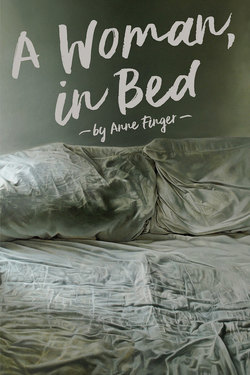Читать книгу A Woman, In Bed - Anne Finger - Страница 10
На сайте Литреса книга снята с продажи.
ОглавлениеJacques
Jacques Melville was a few years too old to be traipsing about France, carrying a knapsack and wearing clothes in need of the attention of a laundress’ starch and irons. By way of contrast, the man who was to become Simone’s husband, while he had shown up at the Vidal door on foot, had done so because his touring sedan had developed engine troubles, which necessitated him finding a night’s lodging. He’d not only worn a cream-colored linen suit, crisp despite the sodden heat of the day, but he had also presented his card to Mme. Vidal, ivory paper engraved with black: LUC HENRI CLERMONT, ingenieur en chef de la linee Athens-Istanbul, Compagnie Internationale des Wagons-Lits et des Grands Express Européens, and did not flinch when Mme. Vidal quoted him a price five francs above her usual charge. (Albert will manage to get a price five francs below the usual by looking imploringly at Mme. Vidal, citing the ties of affection that bound them and that both he and Jacques were students.)
Jacques’ behavior was made even more unusual by the fact that he had a wife and infant son back in Paris. By all rights, he should have progressed to the stage of life where for the holidays one rents a place at the seaside—described as a villa, which proves to be a ramshackle cottage, and where one spends the month battling the sand which finds its way into the chinks between the clapboards of the exterior walls, and from there to the flesh of the half-eaten peach left in the larder, the gaps between one’s toes, the cleft in one’s posterior—and traipsing about in a half-stupor from the sun.
His wife, Sala, knew that such a holiday would not be much of one for the females in the family (Sala’s widowed mother lived with them), what with the ubiquitous sand, the preparing of meals in a kitchen with dented pans and a temperamental gas ring, not to mention the dealings with the local greengrocers, butchers, and fishmongers who saw it as their duty, almost religious in nature, to get the longer end of the stick in their dealings with the summer people. Better for Jacques to head off on his own, burning off some of his wanderlust while Sala stayed in Paris. This arrangement was quintessentially modern—a marriage in which the distaff partner pursued her own ambitions and brought in her own income—but also evocative of ancient tribal societies, where women tended garden and child, while men ventured out in bands, returning home with the kill. If the marriage appeared to outside eyes to be rather unconventional, it was still to Jacques’ taste altogether too conventional.
Albert thought it was his friend’s preternatural seriousness which had led him to make his odd marriage to Sala, a marriage in which there was not only little evidence of passion, but one in which the two partners seemed yoked by sullen resentfulness, more typical in marriages of decades-long duration. The two even seemed to bear an uncanny resemblance to one another—so much so that they were occasionally mistaken for brother and sister. The features which on Jacques’ masculine visage—the leonine brow, the deep-set eyes, dark and brooding—rendered him handsome had the opposite effect on his wife. Her square forehead suggested the prow of a Chinese junk, while her thick dark eyebrows, which met just above the bridge of her nose, gave her face a feral cast. He used tweezers to pull out the errant hairs of his brow, although he was careful not to take his pruning so far he seemed a dandy. Sala disdained such interference—for one thing, she hardly had time to lollygag about plucking at hairs.
Prior to her daughter’s marriage, Sala’s mother had not kept a watchful eye on her daughter’s chastity. Both mother and daughter were advocates of free love. Mme. Prusak had raised her daughter to be forceful and independent—Don’t let anything stand in your way! You’ve got to fight for what you want! Alas for all involved, Sala brought this attitude to her most intimate relations. Jacques’ response to his spouse’s attacks was to grow more diffident, which only increased his wife’s fury. Their marriage was well on the way to becoming one in which one partner is long-suffering and the other a harridan. The reason spoken aloud for Mme. Prusak moving in with them was that she would run the household while they each pursued their vocations, but in fact her primary purpose was to function, not as a drudge but as a duenna, one who prevented the untoward intimacies of full-bore rows.
As the name suggests, Sala’s family was of Russian extraction, her parents political exiles who had narrowly escaped the hangman’s noose, fleeing their homeland with the clothes on their back and a single valise containing a bar of soap, a razor, and items of underclothing, Russian translations of The Iliad, The Odyssey, and The Communist Manifesto.
Like any good babushka, Mme. Prusak sang lullabies to her grandson, but the songs were ones she had learned in clandestine meetings, so that later, when Frédéric would hear marchers moving through the streets of Paris singing Arise ye prisoners of starvation, arise ye wretched of the earth…he would be filled with a desire to sleep.
